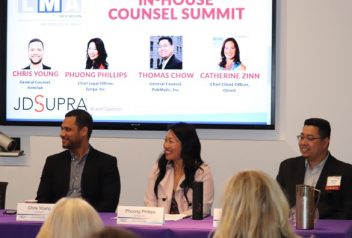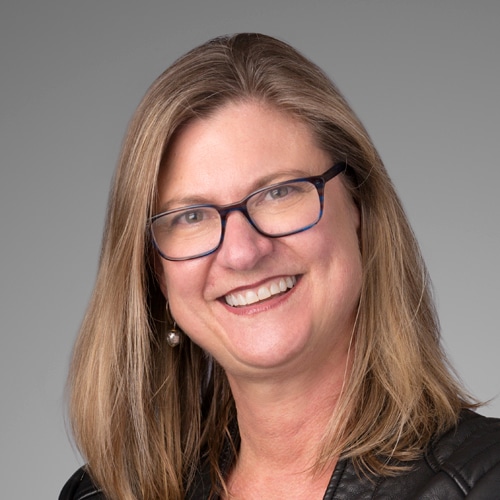Each year, general counsel in Silicon Valley speak to the local chapter of the Legal Marketing Association about their likes and dislikes when working with outside counsel. It’s typically a must-attend for local marketers, and usually just as many lawyers show up as well. What’s so refreshing is the GCs are often brutally honest. In past years, this panel has focused on billing practices, project management, communication styles, responsiveness and the like. This year, though, the three in-house lawyers who spoke made it clear that diversity and inclusion is one of the make-or-break issues they face.
It could be that Silicon Valley GCs are particularly attuned to the issue. Silicon Valley has the highest percentage of immigrant entrepreneurs in the country. And it was area GCs behind the open letter to law firms urging more diversity after Paul Weiss elevated a partner class that appeared to include, judging from a photo composite since deleted from LinkedIn, all white males and one white woman. Michelle Fang, chief legal officer at Turo, based in San Francisco, has been a spokesperson for the group, General Counsel for Law Firm Diversity, which now numbers more than 170 GCs. The letter made it clear that law firms need to improve their own diversity or risk losing their business.
 What Do GCs Want From Outside Counsel? Five Takeaways
What Do GCs Want From Outside Counsel? Five Takeaways
Here are five key takeaways from the panel, which included Thomas Chow, general counsel at PubMatic; Phuong Phillips, chief legal officer at Zynga; and Chris Young, general counsel of Ironclad. Catherine Zinn, chief client service officer at Orrick Herrington & Sutcliffe, served as moderator.
1. Bring Diverse Talent
In-house counsel develop their own networks and portfolios of lawyers, and when a need arises quickly, they often consult peers. Thomas Chow turns to a list serve of fellow Asian American GCs, and compares those suggestions to names he receives from peers in the Association of Corporate Counsel and other tech GCs. “All things being equal, I choose the diverse candidate or look for personality fit,” Chow said. He reaches out to partners and “will have an idea in 48 hours how responsive they are. I can tell by the kinds of things they tell me whether they are pragmatic or not, and whether they are enthusiastic about working with me.”
“Outside counsel who don’t recognize all walks of life will not be good in front of a jury, or understand my business, because we are very diverse,” Chow said.
All things being equal, I choose the diverse candidate or look for personality fit.
Chris Young takes a similar approach. “It’s incredibly important to me to have diverse counsel.” When GCs take over, they may inherit counsel, or even get a directive from a board member to use a certain firm. But over time, they groom their own set of go-to advisors. “I’m half black, I’m perceived as black and treated as black. I feel like there are more black folks who should be at the table.”
Phuong Phillips recently emailed members of the Women’s General Counsel Network when she needed counsel for a government inquiry. Diversity is incredibly important to her, and her company. “At Zynga, 60 percent of our customers are women age 35-60. Four of our eight board members are women. In my legal department of 20, 80 percent of us are women,” Phillips said. Prospective counsel need to mirror the company, and really understand the product and customer base. “Most law firms realize they should bring a diverse slate when they come to see me. It is just the beginning of what we are hoping for, which is a much more diverse community in our company.”
2. Show Your Curiosity
When Phuong was an associate at Wilson Sonsini, she did work for Solar City. “I really wanted to understand the product, so I became a customer. And shortly thereafter they hired me in-house to take them public.”
Young said that when he was general counsel at GoFundMe, he was sometimes pitched by lawyers who “literally didn’t understand how we made money, how many customers we served, where our offices were.” It didn’t bode well for their proposals. “But some people actually demoed the product and set up a GoFundMe campaign. They were raising money for a cause, and I loved that sense of curiosity.”
Invest in building the legal community around you. Be genuinely interested in the community you are serving.
3. Do Your Homework
After the GCs’ letter went out, each panelist said they received marketing materials from firms, to varying reactions.
“I got the literature, but sometimes my name was butchered. I get ‘Phil’ a lot. Don’t do that. It really upsets me,” Phillips said.
One firm, Morrison & Foerster, sent a map of their offices, full of photos of women and diverse attorneys in leadership. The panel agreed that spoke volumes toward the firm’s commitment to true diversity.
Phillips also high-fived MoFo for hosting a recent dinner for 30 women GCs. “I had a chance to meet new GCs, and talk about new corporate governance issues,” she said. “So MoFo is really up there for me right now.”
Young agreed. “Invest in building the legal community around you. Be genuinely interested in the community you are serving,” he said.
The same homework applies to how your client wants to receive communications. “I can’t stand memos, and I hate long emails. And it’s not a good way to communicate with our executive team,” said Young.
Phillips was even more passionate. “We had a spectacular failure recently. We had a group of lawyers come in recently to present to the publishing team, who are a group of sassy, fancy, colorful people. And the president of Zynga came up to me and said ‘what the fuck is this? There are 30 pages of words here! Give me a quick summary when the meeting is over,’ and he left the room. We’re all about PowerPoint. Feed me the information in a way that I can flip it to my team.”
I’m a three-bullet-point person. If I see a 10-page memo, I cry.
Catherine Zinn agreed. “The memo died in 1986, and will never be revived.”
4. Be Mindful of People’s Time
Zinn said Orrick has had success “creating valuable peer-to-peer communities” for clients, where they can mix with colleagues and peers, not just the attorneys trying to cross-sell them. “We try to use people’s time well, and ask people to do things they want to do,” Zinn said.
Some lawyers don’t have time for dinners or interest in sports outings. But Chow is game. “Let’s go out for a meal. Don’t bring glitzy brochures, and don’t always sell me. Just talk to me. One partner tracked me for six years across two companies before I finally got a chance to work with him. Get to know us, so you can be in the right place at the right time.”
5. Be Transparent When Handling Mistakes
And when relationships go south or there is a misstep? “I’m super transparent,” said Phillips. “You’ll know. It’s usually because of the attorney, not the firm. Just bring me another amazing person. That’s how to salvage the relationship. As long as that person does incredibly well.”
Zinn added that authentic apologies go a long way. “I have said to clients I’m sorry that happened, and it’s not OK.”
Chow summed up the panel’s message this way: “Know my business. Know my risk profile. Don’t lecture me about what an outcome should look like. Do your due diligence on the company. Take the time to get to know us. I’m human. I trust people over time when I understand how they think, and that comes with time and relationship building, not glitzy marketing brochures. I want to trust another human being.”
Related: “General Counsel Pen Open Letter on Diversity: What Happens Now?” The May/June issue of Harvard Law’s “The Practice” newsletter reports that the General Counsel for Law Firm Diversity group is working with DiversityLab on strategies and guidelines (see the strategies PDF here) to improve outside counsel diversity.
Illustration ©iStockPhoto.com; photo courtesy of LMA West.
Subscribe to Attorney at Work
Get really good ideas every day for your law practice: Subscribe to the Daily Dispatch (it’s free). Follow us on Twitter @attnyatwork.






















